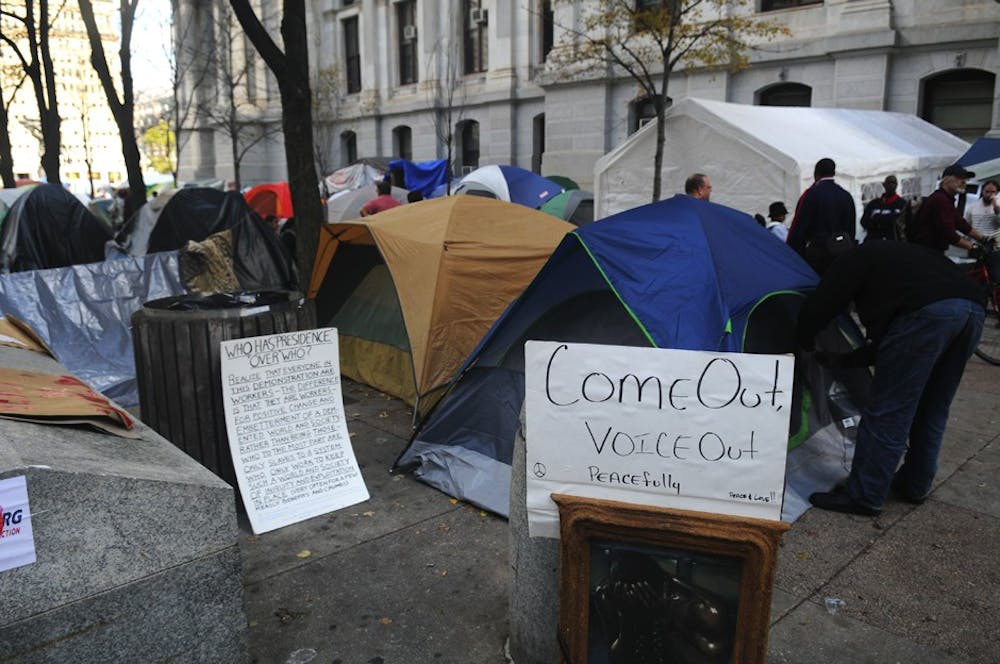
Occupy Philadelphia saw its first sets of handcuffs last weekend.
Fifteen people who had participated in the protest were arrested Sunday for blocking 8th Street near Race Street. Those arrests represented the first since the protest began in early October. According to the Division of Public Safety, none of them were Penn students.
In contrast, no arrests were made Friday when about 500 activists assembled inside and outside Huntsman Hall, where United States House of Representatives Majority Leader Eric Cantor (R-Va.) would have spoken had he not canceled earlier that day.
Those arrested Sunday were participating in a sit-in in honor of the National Day of Protest to Stop Police Brutality, which was not officially added to the Occupy Philadelphia agenda by a General Assembly vote, Public Relations and Media Organizer Jon Laing said. Occupy Philadelphia is a protest against corporate greed, although some protestors are also interested in other issues such as education, police and legalizing marijuana.
MAP: Occupy arrests around the U.S.
Although the police brutality protest was autonomous, Occupy Philadelphia provides legal support for any related persons, said Jody Dodd, member of the group’s legal committee. The protesters were released around 1 a.m. Monday morning and received the lowest level of misdemeanor for obstructing a highway.
There is some worry about undercover cops among protesters, some of whom have crime histories or negative experiences with the police, Laing said. “Low-income families tend to be more wary of the police.”
However, the police have in general been “great,” Laing said, who added the police allowed the protesters to obstruct traffic for 17 hours before making arrests.
“So far everything has remained peaceful,” including Sunday’s arrests, Laing said. “No one has been hurt, sprayed injured or beaten.”
“The police have been behaving as they should” surrounding First Amendment activity, Dodd said.
However, Dodd added that the number of Philadelphia policemen present blocking off City Hall and barricading surrounding walkways is “overkill,” and unnecessary because of the peaceful state of the protest.
The first five days of the protest cost the police department $164,000 in police overtime, according to The Philadelphia Inquirer. If they want to cut costs, “send [the officers] home … they don’t need them” Dodd said.
Philadelphia resident Maureen Forster, who has participated in both the Occupy Philly and Occupy Wall Street protests, said protesters feel the Philadelphia police are “on our side.” The New York Police Department, in contrast, had a stronger presence at Occupy Wall Street, where Forster witnessed about 30 to 40 officers enter the camp to make an arrest.
In addition, Forster witnessed a police officer yelling inches from another protester’s face at Occupy Wall Street. There was only “anger and negative energy” behind his actions, she said.
Other criminal activity has not been a problem, according to organizers. Laing said he had not heard of any theft at the protest. One wallet that went missing was later returned to its owner.
When Forster spent a night camped out in front of City Hall, she felt a “safe feeling.” Although surrounded by complete strangers, Forster said “I trust them more than I trust the government.”
Sleeping on the concrete alongside the homeless who have been occupying the area long before protesters has been an “enlightening” experience for Laing, who has had in-depth conversations with some and watched others speak their minds on microphones before other protesters.
Outside of dealing with Sunday’s arrests, Occupy Philadelphia’s legal team has been “running to catch up” to lay groundwork. Since the protest was organized at such short notice, the team has been working to find lawyers to volunteer to represent protesters if necessary and to solve glitches in its legal hotline, Dodd explaned. In addition, the legal committee will work to facilitate communication between the city and the protesters.
The Daily Pennsylvanian is an independent, student-run newspaper. Please consider making a donation to support the coverage that shapes the University. Your generosity ensures a future of strong journalism at Penn.
DonatePlease note All comments are eligible for publication in The Daily Pennsylvanian.







